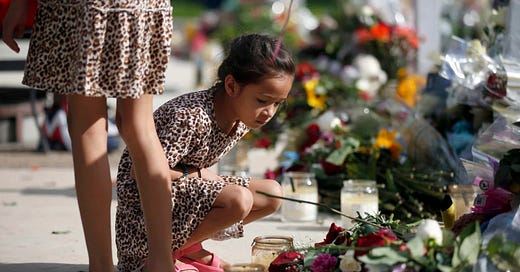Gun Violence Grows as Global Temperatures Climb
Is there a relationship between shootings and climate change?

Hello friends,
Hope you're all doing ok 💕 and staying safe. This past month has been extremely challenging, and we are mortified by all of the terrible shootings that have happened in the past couple of weeks. Since the Uvalde shooting, more than 17 mass shootings have happened in the U.S. already, 14 this past Memorial Weekend alone.
We want to take time in this week’s edition to talk about the rising challenges climate change can pose for violent crimes. Back in 2011, one study theorized that climate change would be “one of the major forces driving crime as the century progresses.” With challenges to social control, health disparities, increased economic strain, rising temperatures can potentially exacerbate the rate of crime — often disproportionately burdening communities of color.
Recent data seems to match this story, identifying that in Chicago, a 10-degree increase above the average temperature was associated with a 33.8% increase in shootings. And with an estimated 390 million guns in circulation in the U.S., it’s scary to believe that it might continue to get worse.
Higher Temperature, Shorter Fuses
The perceived connection between climate and crime is not a new phenomenon. People have long associated getting angry with hot “tempers” or a “fiery” rage. Even Shakespeare called it out between the Capulets and Montagues as a “mad blood stirring” in Romeo and Juliet.
Ever since the mid-1990s with the rise of reliable crime statistics, sociologists and criminologists have been trying to identify the leading factors for this connection. What most of these studies landed on, is that the increased air temperature is the leading cause — violent crimes against people tended to peak during the summer.
This appears to be the case across the globe. Mexico saw more organized crime, Taiwan faced significant increased rates of violence, the UK arrested more violent crimes, Greece discovered more than 30% of its homicides happening when it was hot, and South Africa identified that for every degree increase, there is a 1.5% increase in murders.
Several studies also found that an overwhelming majority of uprisings and social movements start during the summer, and as temperatures rose, they grew increasingly likely to get violent. Suicides themselves are also associated with an increase in temperature.
The most obvious reason for this potential connection is that the hot weather is incredibly uncomfortable. We sweat, get into worse moods, eventually leading us to be more angry and stressed out. The heat affects us biologically, causing us to flare up more aggressively. People were even found to feel drastically more different between hot and cold days, then compared to whether they are divorced or married.
A recent 2020 study concluded that based on all this past evidence, depending on how much the Earth warms up, the U.S. might expect an additional 2.3-3.2 million violent crimes between 2020 and 2099.
The U.S. has a long way to go in curbing gun violence and we hope that with the outburst from recent events action will be taken 🙏🏻.

Things We're Consuming This Week
🐭Have you heard about the Bramble Cay melomyses — the first creature lost to the recent human-caused climate change?
🎨 So y’all saw the man dressed as an old woman throwing a cake at the Mona Lisa shouting about climate change right? It wasn’t just a fever dream, or Midnight in Paris?
🌳 A recent study by Frontiers in Public Health has been able to finally quantify the impact of planting trees — saving thousands of lives.
🚗 Electric vehicles continue to hit the market faster than ever, displacing more than 3% of total oil demand. At this current pace, BloombergNEF believes that by 2035, this would represent the “permanent removal of oil dependency.”
☀️ Depending on how much you earn, the summer in NY could be a lot worse.
🌋 Listen to Jamie Beard talk about how geothermal energy can be used as a clean, renewable energy source.
🌀 Be careful down South as the Atlantic hurricane season is picking up, with the first storm potentially flooding South Florida
🌊 Studying the Great Barrier Reef has helped us understand our oceans and the role they play in the ecosystem. Unfortunately over 90% of the coral reef studied was bleached.
🍉 A lot of days this month we've felt like eating our feelings. Here's a bunch of yummy vegan comfort food recipes.
Things You Can Do
🎤 Check out the interviews done with Daniel Semenza, a criminologist who has long proclaimed the connection between climate change and rising crime.
🏫 See how you can help prevent school shootings and get your congresspeople involved.
Take care of yourself 💓, be with your family, and stay cool.








This is an interesting idea! It also relates to how a lack of basic necessities (water, food, shelter) leads to more violence.